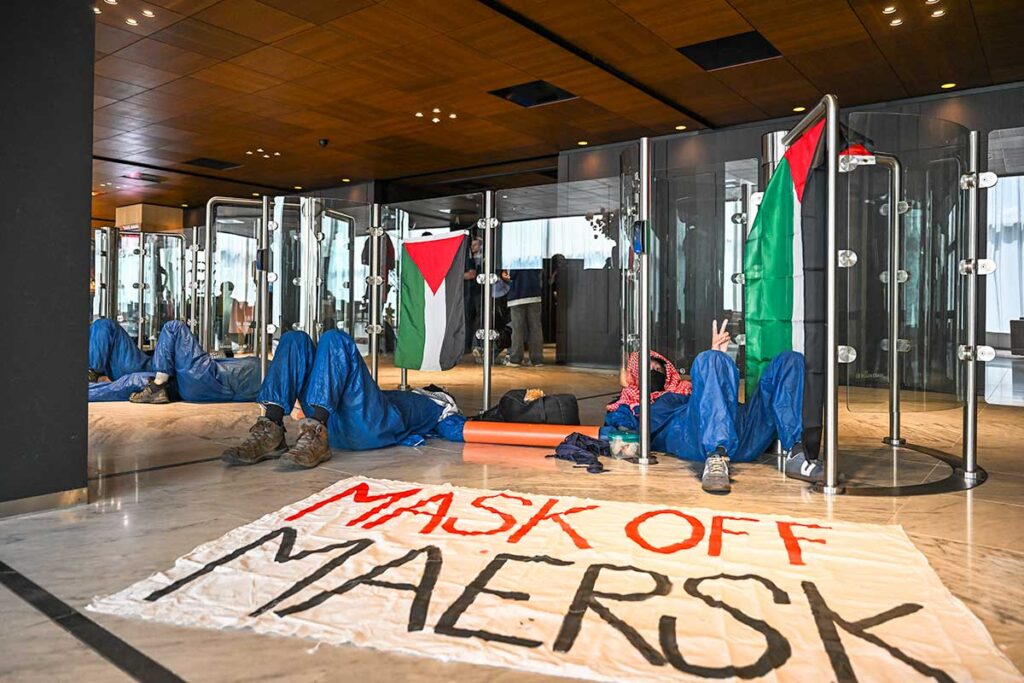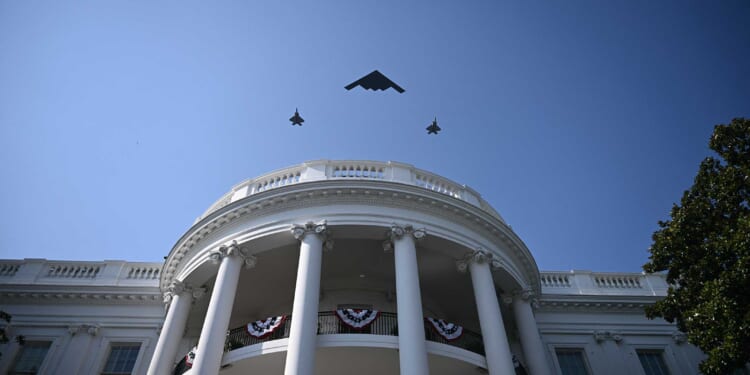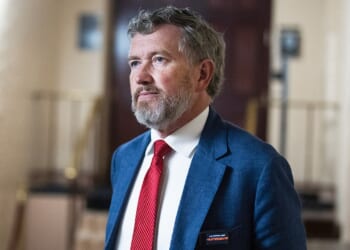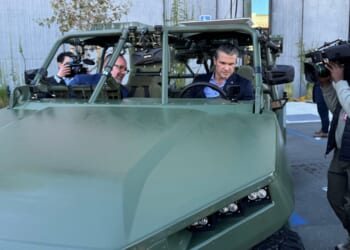Activists have launched a global campaign to undermine production of the Lockheed Martin F-35 Lightning II stealth fighter, one of the crown jewels of the U.S. air force. Across the world, activists closely tied to the radical anti-Israel movement are pressuring airports, protesting companies, demanding arms embargoes, and even engaging in more militant direct actions.
In a recent letter to FBI director Kash Patel, Senator Tom Cotton highlighted just one instance of this movement: viral comments from Aisha Nizar, a steering committee member of the Palestinian Youth Movement’s “Mask Off Maersk” campaign, which targets the global shipping giant. Nizar called on activists to “intervene” in the F-35’s “supply chains.” Representative Paulina Luna, an Air Force veteran, has raised concerns as well.
Finally, a reason to check your email.
Sign up for our free newsletter today.
Lawmakers, federal partners, and international allies need to understand the breadth of this effort. The F-35 has become a global rallying point for the far Left, sparking protests across Europe and even leading to militants’ destruction of a security firm’s office for its role in manufacturing components of the jet. Left unchecked, this movement could pose a serious threat to American military readiness.
Why target the F-35? The plane is a product of international collaboration. Many NATO countries contributed to its development. Outside the United States, 19 nations use F-35s. This global footprint is a strategic asset for joint operations, but it also makes the program a lightning rod for criticism. Israel’s deployment of the F-35 in its war with Hamas has drawn further scrutiny from far-left activists.
Campaigns targeting the F-35 began in November 2023, when Danish activists launched actions against the Terma Group, a manufacturer of F-35 components. Around the same time, prominent far-left activist Calla Walsh and her organization carried out various “direct action[s]”— a purposefully vague term that encompasses tactics ranging from boycotts and protests to more aggressive measures like political violence, sabotage, and vandalism—against defense contractors in New Hampshire, New York, Massachusetts, and Virginia. Walsh and her group began with acts of vandalism, gradually escalating their efforts until they engaged in full-scale sabotage and were charged with rioting, sabotage, burglary, and conspiracy. Within Our Lifetime, the New York-based group led by Nerdeen Kiswani, targeted Brooklyn Navy Yard as a site involved in arms transportation. Months before, protests had erupted outside factories in Melbourne, Australia, with some activists protesting from rooftops.
In the United Kingdom, the response was even more militant, driven by the now-proscribed group Palestine Action U.K. Britain produces 15 percent of all F-35 components, so disruptions there can ripple across the program. Between October 2024 and March 2025, Palestine Action carried out a range of militant actions, including a factory blockade, gate-ramming, property damage, and even climbing onto a factory roof to damage a building.

As Palestine Action U.S. and U.K. both came under legal scrutiny, activists began researching other vulnerabilities in the supply chain, looking to apply pressure with their partner organizations.
In June of this year, the New York City Democratic Socialists of America held an event titled “Logistics of Empire: International Shipping and the Fight for a Free Palestine.” Presenter Ibtihal Malley—a recent New York University graduate student affiliated with the Palestinian Youth Movement—spent much of her presentation focused on the F-35, including its supply chain.
“Nearly all maritime shipments of the F-35 components to Lockheed Martin and Northrop Grumman have been transported by Maersk,” Malley said, referring to the international shipping company. “Without these shipments the F-35 wouldn’t have the ability to store fuel or power its flight control systems, refuel mid-flight, open the gun door, load bombs, or drop bombs.” During the Q&A, Malley added that she considers Houston to be the origin point of the F-35 supply chain.
Also presenting was Ahmed Husain, who “coordinates No Appetite for Apartheid, Maersk, and other BDS initiatives nationally.” Husain—who now sits on the DSA’s National Political Committee as a representative of one of its most radical caucuses—explained why targeting supply-chain logistics is critically important.
“We’re inside the home of empire. We’re inside the house. It is our job here. . . . As they fight there, we fight here. There’s [sic] multiple fronts,” Husain said.
“This is the pillar of American empire. Logistics is the pillar that like transports all this stuff all over the world. So, we’re going to have to be really, really creative to chip away at this over many years, many decades,” he added.
A month later, at a California-based DSA discussion on “Mass Work and Mass Politics,” Abdullah Farooq—who was elected to the DSA’s National Political Committee—revealed more details about who is targeting supply lines.
“I’m a UAW member out of Los Angeles and a member of Labor for an Arms Embargo. I’m also on the National Labor Commission Steering Committee where we helped to launch this campaign,” Farooq explained. “The campaign is essentially a campaign to try to build up support at the level of membership across unions, across sectors, and across this country.”
He added that “through some of the work that we’ve done in collaboration with the Palestinian Youth Movement and the Progressive International . . . . We’ve been able to map out a good chunk of how weapons are moved around the country and how weapons are moved from the United States to Israel.”
“Our campaign has really focused on trying to identify local targets, whether that’s a port, whether that’s an airport, and then to organize workers around those targets,” Farooq added. “And right now, we have some really exciting work that’s going on in New York City where workers and DSA members are starting to organize around JFK airport, which ships weapons on a really regular basis to Israel and we’re kind of seeding these campaigns through local and national trainings across the country.”
These comments provide glimpses into a campaign that is national—indeed global—in scope. Activists have a clear picture of the F-35 supply chain and are looking for opportunities to disrupt it at every node.
Since the People’s Conference for Palestine in August—at which Nizar made the comment that attracted Cotton’s attention—the movement has escalated. Activists have targeted the Oakland Airport. Spain’s parliament approved an arms embargo on Israel, following massive street protests across Spanish cities. Similar demonstrations have erupted in Amsterdam, London, and Rome. Dutch foreign minister David van Weel even announced that the Netherlands likely will not send additional F-35 parts to Israel.
Over Columbus Day weekend, the F-35 boycott movement continued to surge. On October 19 in Houston, activists demanded a local arms embargo to block the shipment of F-35 wings from the port, aligning with the Mask Off Maersk campaign led by the Palestinian Youth Movement. The Democratic Socialists of America reaffirmed their support for both Mask Off Maersk and Labor for an Arms Embargo in their October 13 statement, “Until Palestinian Liberation.” Even the official page of the BDS Movement declared October 13 through 18 the “Week of Action Against F-35s” and called on supporters to “escalate pressure through peaceful disruptions, email storms . . . and/or mass protests against complicit ministries, members of parliaments and manufacturing companies.”

The timing of all this activity is unusual, given the recent ceasefire in the Gaza War. Yet—as the DSA’s Abdullah Farooq openly acknowledged—the campaign is meant to be long-term.
The effects are already being felt, as countries involved in the F-35 program are being challenged in court to distribute parts selectively, despite being formal partners. It’s not hard to imagine how American military preparedness could be negatively affected by an emerging arms embargo bloc driven by the far Left. If the anti-F35 movement is allowed to grow unchecked, it will pose a serious threat to national security.
Senator Cotton and Representative Luna’s calls for action only scratch the surface. Comprehensive action is needed to check this threat to America’s military future before it gains even more momentum.
Top Photo by BRENDAN SMIALOWSKI/AFP via Getty Images
Source link


















